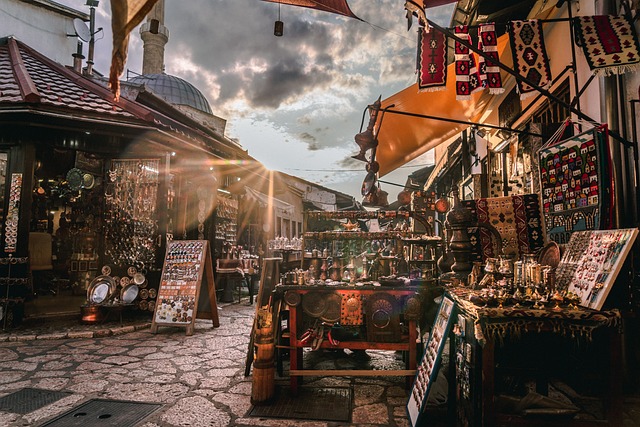Offbeat Travel Destinations: Exploring the Road Less Traveled

In a world where travel has become increasingly accessible, there remains a special allure in venturing off the beaten path to explore offbeat destinations. These unique and unconventional places offer travelers a chance to witness nature’s wonders, embrace diverse cultures, and create unforgettable memories. However, with the privilege of discovering these hidden gems comes the responsibility to practice sustainable and responsible tourism, ensuring the preservation of these delicate locations for generations to come.

The Enchanting Charms of Antarctica
Antarctica, the southernmost continent, remains an untouched paradise for intrepid adventurers. Its surreal landscapes of icebergs, glaciers, and wildlife offer a once-in-a-lifetime experience. Travelers can encounter penguins, seals, whales, and numerous seabird species amidst this frozen wilderness.
Practical Tips for Traveling to Antarctica
- Choose Responsible Tour Operators: Opt for tour operators that follow strict guidelines for preserving the environment and wildlife, such as the International Association of Antarctica Tour Operators (IAATO).
Minimize Environmental Impact: Respect guidelines to avoid disturbing wildlife, refrain from littering, and participate in organized clean-up efforts.
- Offset Your Carbon Footprint: Consider carbon offset programs to neutralize the environmental impact of your journey.
Unearthing the Mysteries of Socotra, Yemen
Socotra, an archipelago in Yemen, is a biodiversity hotspot known for its otherworldly landscapes and unique flora and fauna. The dragon’s blood trees, found only on this island, create a surreal and alien-like environment.
Practical Tips for Traveling to Socotra
- Check Travel Advisories: Stay informed about the current political situation in Yemen and Socotra and ensure safety and stability before planning your trip.
- Respect Local Customs: Engage with the local Socotri people respectfully and seek their permission before taking photographs.
- Support Local Communities: Contribute to the local economy by purchasing souvenirs and handicrafts directly from artisans.
Bhutan: Where Gross National Happiness Prevails
Bhutan, a tiny kingdom nestled in the Himalayas, is known for its unique approach to development and prioritizing the happiness of its citizens. Travelers can explore ancient monasteries, stunning landscapes, and immerse themselves in Bhutanese culture.
Practical Tips for Traveling to Bhutan
- Obtain a Visa in Advance: Bhutan requires visitors to obtain a visa before arrival, which can be processed through authorized tour operators.
- Embrace the Culture: Respect local customs and traditions, such as dressing modestly, removing shoes before entering temples, and refraining from smoking in public places.
- Contribute Positively: Choose tour operators and accommodations that support local communities and sustainable practices.
The Hidden Gems of Faroe Islands

The Faroe Islands, an autonomous territory of Denmark, captivate travelers with their dramatic cliffs, cascading waterfalls, and charming villages. This remote destination offers a glimpse into the authentic Nordic way of life.
Practical Tips for Traveling to the Faroe Islands
- Respect Nature: Stick to marked trails to protect fragile ecosystems, and be mindful of nesting birds during birdwatching.
- Support Local Cuisine: Sample traditional Faroese food, including fermented fish and lamb, and contribute to the local economy by dining in local restaurants.
- Participate in Clean-up Efforts: The Faroese take pride in keeping their islands clean, and visitors can join beach clean-up initiatives to help maintain the pristine environment.
Adventure in Turkmenistan’s Door to Hell
Turkmenistan’s Door to Hell, a flaming gas crater in the Karakum Desert, is an otherworldly spectacle that has drawn adventurers for decades. Travelers can also explore the country’s ancient Silk Road cities and unique landscapes.
Practical Tips for Traveling to Turkmenistan
- Obtain a Tourist Visa: Turkmenistan requires visitors to have a visa arranged through a travel agency before arrival.
- Respect Local Traditions: Turkmenistan is a conservative society, and travelers should dress modestly and ask for permission before taking photographs of people.
- Travel with Local Guides: Local guides can provide valuable insights into Turkmen culture and history while ensuring responsible travel practices.
Exploring the Vibrant World of Madagascar
Madagascar, an island nation off the southeastern coast of Africa, is a biodiversity hotspot teeming with unique flora and fauna, including lemurs. Travelers can experience its natural wonders, vibrant culture, and beautiful beaches.
Practical Tips for Traveling to Madagascar
- Support Conservation Efforts: Many national parks and reserves in Madagascar require entry fees, and these funds contribute to conservation efforts and local communities.
- Choose Eco-friendly Accommodations: Opt for lodges and hotels that prioritize sustainability and eco-conscious practices.
- Engage with Local Communities: Learn about the Malagasy culture and customs, and support local artisans by purchasing their handicrafts.
Trekking through the Colombian Cocora Valley
Colombia’s Cocora Valley is home to the towering wax palm trees, the tallest palm species in the world. Travelers can embark on picturesque hikes, explore coffee plantations, and immerse themselves in Colombian culture.
Practical Tips for Traveling to Cocora Valley:
- Respect the Environment: Stick to designated trails to avoid damaging the fragile ecosystem, and avoid picking plants or disturbing wildlife.
- Support Sustainable Coffee: Take part in responsible coffee tours that promote sustainable farming and fair wages for coffee producers.
- Learn Basic Spanish: While some locals may speak English, knowing basic Spanish will enhance your experience and interactions.
The Allure of Namibia’s Otherworldly Landscapes
Namibia’s surreal landscapes, including the iconic dunes of the Namib Desert, offer a mesmerizing experience for travelers seeking offbeat destinations. Wildlife enthusiasts can also spot desert-adapted animals.
Practical Tips for Traveling to Namibia:
- Desert Etiquette: Avoid driving off established tracks to protect delicate desert flora, and practice responsible wildlife viewing from a safe distance.
- Respect Local Cultures: Namibia is home to diverse ethnic groups, each with unique traditions and customs, so understanding and appreciating their culture is essential.
- Water Conservation: Namibia is prone to drought, so practicing water conservation is crucial to maintaining the delicate balance of the ecosystem.
The Charismatic Ghost Towns of Chernobyl, Ukraine
Chernobyl, the site of one of the world’s worst nuclear disasters, has transformed into an eerie tourist destination. While exploring the abandoned town, travelers can witness nature’s reclamation of the area.
Practical Tips for Traveling to Chernobyl
- Take Guided Tours: Explore Chernobyl with licensed guides who are knowledgeable about the area’s history and ensure safety during your visit.
- Follow Safety Measures: Adhere to guidelines and avoid touching objects or vegetation to minimize exposure to radiation.
- Show Respect: Remember that Chernobyl was a tragedy for many, so be respectful and mindful of the area’s somber history.
Bask in Tranquility at Japan’s Yakushima Island
Yakushima, a UNESCO World Heritage Site in Japan, is renowned for its ancient cedar forests, some of which are thousands of years old. Travelers can embark on enchanting hikes and experience Japan’s spiritual connection with nature.
Practical Tips for Traveling to Yakushima Island:
- Hiking Preparations: Be physically prepared for hikes, check weather conditions, and ensure you have the right gear to explore the forest trails.
- Environmental Conservation: Follow Leave No Trace principles and avoid damaging ancient trees or disturbing wildlife.
- Learn Japanese Phrases: While some locals may speak English, knowing basic Japanese phrases will enhance your interactions and show respect for the local culture.
Offbeat travel destinations offer a world of unique experiences, providing travelers with the opportunity to explore hidden wonders and connect with diverse cultures. However, with this privilege comes a responsibility to practice sustainable and responsible tourism. By respecting local customs, supporting local communities, and minimizing our environmental impact, we can ensure that these offbeat destinations remain preserved and cherished for generations to come. As travelers, let us embrace the magic of the road less traveled and safeguard the beauty of these extraordinary places.



